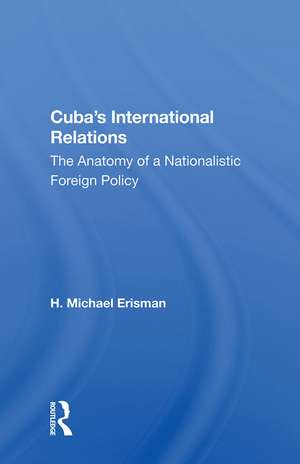Cuba's International Relations: The Anatomy of a Nationalistic Foreign Policy
Autor H. Michael Erismanen Limba Engleză Hardback – 7 iun 2019
Preț: 764.20 lei
Preț vechi: 1102.79 lei
-31% Nou
Puncte Express: 1146
Preț estimativ în valută:
146.28€ • 158.94$ • 122.95£
146.28€ • 158.94$ • 122.95£
Carte tipărită la comandă
Livrare economică 21 aprilie-05 mai
Preluare comenzi: 021 569.72.76
Specificații
ISBN-13: 9780367005245
ISBN-10: 0367005247
Pagini: 220
Dimensiuni: 152 x 229 mm
Greutate: 0.45 kg
Ediția:1
Editura: Taylor & Francis
Colecția Routledge
Locul publicării:Oxford, United Kingdom
ISBN-10: 0367005247
Pagini: 220
Dimensiuni: 152 x 229 mm
Greutate: 0.45 kg
Ediția:1
Editura: Taylor & Francis
Colecția Routledge
Locul publicării:Oxford, United Kingdom
Cuprins
1 An Overview of Cuban Foreign Policy and Its Nationalistic 2 The Early Evolution of Cuban Foreign Policy, 1959- 3 Incipient Globalism, 1972-1975 4 The Maturation of Cuban Globalism, 1975-1979, 5 Contemporary Cuban Globalism, 1979 Onward 6 Problems and Prospects for Cuban Foreign
Descriere
From its inception, Fidel Castro's revolution has exerted an impact on the international scene far out of proportion to Cuba's modest size and limited resources. This phenomenon became more pronounced in the mid-1970s as Havana's foreign policies took on truly global parameters that involved the dispatch of large combat forces to Angola and Ethiopia, the initiation of ambitious military and developmental aid programs for Third World nations, and the assumption of leadership of the Nonaligned Movement. Today Cuba remains a significant actor on the world scene, giving top priority to Caribbean and Central American affairs. Critics, especially in the United States, have insisted that Cuban globalism is not a nationalist expression, that Cuba is but a surrogate for the Soviet Union. Such charges, however, ignore or seriously underestimate the role that nationalism has always played in the Cuban Revolution. This book explores the nature and development of Castro's foreign relations in general and Cuban globalism in particular, with primary attention devoted to nationalism's influence on Havana's policies toward the United States, the Soviet Union, and especially the developing (mostly nonaligned) African, Asian, and Latin countries of the Third World. To give the reader an in-depth Cuban perspective on crucial international issues, excerpts from Castro's major speeches and press interviews are included. Erisman concludes that the nationalistic dimension of Havana's foreign policies has definitely not been fully appreciated, and this omission obscures the complexity and true essence of Cuban globalism.
